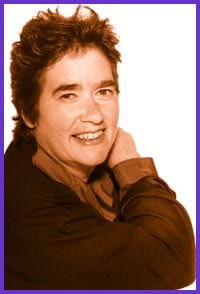“To be a woman in jazz is to be a strong woman,” says Kye Marshall, paradoxically, in an ultra-gentle tone of voice.
They certainly don’t come stronger, more talented or more versatile than Marshall.
She’s a consummate jazz and classical music composer, one of Canada’s finest cellists, a successful music psychotherapist and a mover and shaker of Toronto’s women’s movement since the early 1970s. To spend an hour with Marshall is to treat oneself to a mesmerizing trip down Toronto’s changing musical and sexual politics scenes over the last 30 years.
But it’s jazz music that Marshall is focussing on creatively for now, in particular, her new CD, Winter’s End. It’s a sophisticated, immaculately produced and passionately delivered collection of Marshall’s jazz compositions. Marshall is joined by Don Thompson (piano), Kevin Barrett (guitar), Andrew Downing (bass) and Anthony Michelli (drums).
Those seeking a new musical experience will be thrilled to hear Marshall’s avant-garde experimentation with the cello, while jazz purists can rest assured that Winter’s End incorporates the harmonic colour and rhythmic vitality of standard jazz.
Using the cello, an instrument normally associated with classical music, in a jazz recording maybe unorthodox, but it does create a unique sound; Marshall is no stranger to crossing over musical styles and boundaries.
Take the story of her conversion to jazz for example.
After 17 years as principal cellist with the (then called) O’Keefe Orchestra, she felt creatively stifled and decided to learn jazz in order to indulge her love for free improvisation. “In an orchestra, you’re just playing the music that people are telling you to do,” says Marshall. “It’s like a machine, there’s no room for creativity or individuality.”
There is plenty of individuality in Winter’s End. Rather than including jazz standards by the likes of Charlie Parker or Miles Davis, as most jazz instrumentalists do in their early recordings, Winter’s End features all-new compositions by Marshall.
“I was actually going to do some standard tunes on it along with the originals,” she explains, “but when we [Thompson and Marshall] got together the songs, we went through the originals and we kept saying, ‘This is good and this is good.’ So we said, ‘Why not?'”
Winter’s End draws on Marshall’s personal life. From the quirky rhythm of “Mad Mary,” inspired by an old history school teacher, to the gentle “TLC,” dedicated to a former partner, Winter’s End is fragments of Marshall’s life set to her own music.
“My previous partner died of hepatitis C about five years ago,” says Marshall, referring to author Lina Chartrand. “When we were together, I wrote this song that I called ‘TLC: To Lina Chartrand.'” The tune is also about the tender loving care the women had for each other.
Marshall’s love and dedication to the local women’s community is evident in her pioneering work to establish the Women’s Common in 1988, Toronto’s first women-only community space. “I put years of my life into that place,” Marshall says wistfully of the now-defunct centre.
It’s all part of a different time and mindset in the history of Toronto’s women and lesbian communities. “When I started out kind’a discovering that I’m a lesbian, it was not common,” recalls Marshall who graduated from the University of Toronto with a Bachelor of Music in 1967. “There was no where to go and it was a pretty lonely and frightening journey for a long time.
“Now the lesbian community is so strong and it’s easy to come out. But over in those days, it wasn’t accepted.”
Not that acceptance for women in general and lesbians in particular is all that easy in the jazz world – especially for women composers. Despite her breakthroughs, Marshall still believes jazz to be “male-identified” and a “boys’ club.”
When she’s not busy performing with the boys or composing new material, Marshall combines her love for music with a fascination with psychology through her work as a trained music psychotherapist.
Using easy-to-play instruments, Marshall encourages her clients to improvise to provide a vehicle for creativity and non-verbal self-expression.
“Music exists within us on all kinds of levels,” says Marshall. “Psychologically, emotionally, physically, cognitively and spiritually, it’s a very integral force in our lives.”
Listening to the passionate tunes in Winter’s End proves how music has been the force behind this particular woman’s life.
Marshall has a gig coming up Sat, Jan 29 at Mezzetta (681 St Clair Ave W); call (416) 658-5687.

 Why you can trust Xtra
Why you can trust Xtra


